As we age, our skin is affected by external factors (like the sun’s UV radiation) and internal factors (such as what we eat). Taking care of our skin means we have to address both external and internal factors. With external factors, it’s fairly straightforward: we need to apply sunscreen and wear clothes to protect our skin from sun damage. Internal factors depend a lot on our diet. That’s why we put together this list of 20 of the best foods for your skin!
Fatty Fish
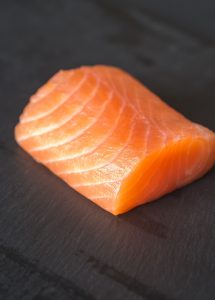
Your skin needs omega-3 fatty acids. Some of the best sources of this fatty acid are found in fatty fish like salmon, mackerel, tuna and sardines. They help keep the skin moisturized and supple. [1] Omega-3s are also an anti-inflammatory and protect against auto-immune conditions that affect the skin. [2]
Fatty fish also contain vitamin E, an antioxidant that protects the skin from harmful free radical molecules. In one review, vitamin E is also recognized as “photoprotectant” (it protects you from sun damage). The review also notes that vitamin E works best with vitamin C. Keep a look-out for foods in this list that contain vitamin C, and include them with your fatty fish! [3]
And finally, these fish have zinc. Zinc is very helpful for the skin—zinc-based enzymes and proteins are needed for the skin’s continual renewal. It also fights against inflammation and helps wound healing. [4]
Sweet Potatoes and Carrots
Sweet potatoes and carrots contain beta-carotene. This is a plant pigment (which gives these foods their orange color) that converted into vitamin A in your body. Vitamin A is also an antioxidant, protecting the cells from free radicals.
Some studies show that beta-carotene can protect your skin against UV irradiation. Though it is not as effective as sun block, it can increase your skin’s natural defenses. It also contributes to the maintenance of skin health and appearance. Your skin is constantly replenishing its cells, but it will still take a few weeks for you to see the effects. [5]
Bone Broth
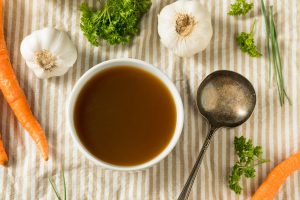 Bone broth is the classic source of collagen. Collagen is the most abundant protein in your body, located in the joints, muscles, bones, and the skin. It is made naturally by the body, but production decreases as we age. That is why low levels of collagen are associated with aged and wrinkled, dry skin.
Bone broth is the classic source of collagen. Collagen is the most abundant protein in your body, located in the joints, muscles, bones, and the skin. It is made naturally by the body, but production decreases as we age. That is why low levels of collagen are associated with aged and wrinkled, dry skin.
To make bone broth, you can save leftover bones from cooking or contact a local butcher. Some companies like US Wellness Meats or Healthy Traditions also sell them. Most recipes require boiling the bones (perhaps with other ingredients or herbs) for several hours. Here are some bone broth recipes to get you started.
Include other protein-rich foods in your diet to boost collagen levels, such as fish, chicken, eggs, red meat, and dairy products. However, be careful not to eat too much. Your body has a limit on how much protein it can process at a time, which caps at 30 grams. [6]
You can also make it easier by consuming collagen as a supplement. Hydrolyzed collagen is broken down so your body can absorb it with ease.
Avocados
Avocados contain both vitamin E and vitamin C, which can help protect the skin from sun damage. 100 grams of avocado contains 10% of the recommended daily intake of vitamin E and 16% of vitamin C. [7]
Vitamin C is also needed for the production of collagen. Along with your bone broth, protein-rich food, or collagen supplement, make sure you are getting plenty of foods rich in vitamin C. Several items on this list are, so take note!
Healthy fats found in avocados help keep the skin moisturized and elastic. One study of over 700 women showed that a high intake of these healthy fats improved their skin. [8]
Nuts and Seeds
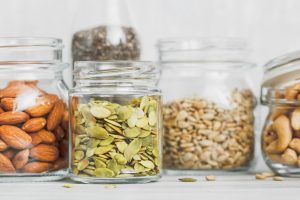
Many nuts and seeds contain nutrients that your body needs to maintain healthy skin.
Walnuts have essential fatty acids, including omega-3 and omega-6. These may help fight inflammation, reducing puffiness. [9] Walnuts are have zinc—only 1 ounce (or 28 grams) of walnuts contains 6% of your recommended daily intake (RDI). And, like many other skin-healthy foods, they are also a source of vitamins E and C. [7]
They also contain selenium. Selenium is a mineral found in the soil and some foods. It is an antioxidant and plays a part in making DNA, reproduction, and thyroid function. And the body doesn’t need a lot of it to see the benefits. As an antioxidant, selenium helps stabilize free radicals and works with vitamin E to provide a protective coating around your cells. It helps reduce UV damage and inflammation. It may also be helpful in fighting infections and preventing skin cancer. [10] [11]
Selenium can also be taken as a supplement. Note: do not give selenium supplements to children before they have all of their adult teeth. High doses can interfere with the formation of tooth enamel. [10]
Like walnuts, sunflower seeds are a rich source of vitamin E, selenium, zinc, and protein. One ounce of sunflower seeds has 37% of the RDI of vitamin E, 32% of the RDI of selenium, and 10% of the RDI for zinc. Don’t undervalue this little seed in your journey to skin care from the inside out! [7]
Almonds are another great source of these vitamins and minerals. What’s more, some research says that when you consume vitamin E, you have more of it on your skin’s surface. That helps your skin stay moisturized. [6]
Tomatoes
Tomatoes are a skin-friendly food. They are full of vitamin C. Don’t forget, vitamin C is essential for your body to create collagen. When your vitamin C levels are doing well, your collagen production will follow suit.
Tomatoes are a triple-threat against skin damage. They contain three caroteinoids: beta-carotene, lutein, and lycopene. These all work to protect the skin against sun damage and prevent wrinkling. [6] [7]
One study in the British Journal of Dermatology had two groups – one group ate five tablespoons of tomato paste a day, and a control group that did not. The tomato group had 33% more protection against sunburn that the control group. [16]
Fun fact: healthy fats help your body absorb these carotenoids. It’s recommended you eat with good fats such as fatty fish, cheese, or olive oil.
Broccoli
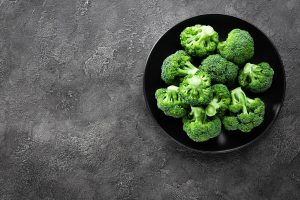
Broccoli is great for many reasons. This helpful vegetable is a great source of zinc, vitamin A, and vitamin C.
It also contains lutein. Lutein is a carotenoid like beta-carotene. And like beta-carotene, it protects the skin from oxidative damage. [7]
Broccoli florets also have sulforaphane. Sulforaphane is a compound that protects against sun damage and free radicals. Several studies have also demonstrated its ability to reduce a person’s risk of cancer. [12] [13] [14] [15]
Vitamin K is also found in broccoli. This vitamin can be helpful in healing bruises and even lightening those dark circles under your eyes. [6]
Bell Peppers
Red and yellow bell peppers are another great source of beta-carotene. In fact, one cup of red bell peppers contains 92% of your RDI of vitamin A. These are also a great source of vitamin C, one cup containing an astounding 317% of the recommended daily intake. They also help your blood circulation in your skin, giving you a healthy, youthful glow. [7]
Watermelon
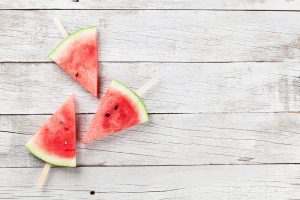
On top of being a sweet summer treat, watermelon can help your skin. Interestingly enough, watermelon’s high water content can actually reduce the water retention in your skin, which is what often leads to puffiness around your eyes.
Other foods with high water content, such as cucumbers, beets, tomatoes, and celery can have similar results.
Watermelon is also lower in sugar compared to most other fruits. This helps your body avoid glycation, which is the chemical reaction that can compromise collagen. [6]
Olive Oil
Olive oil is another source of healthy fats and essential fatty acids. 75% of the fats in olive oil are monounsaturated fatty acids, which may promote youthful skin. [7]
The polyphenols in olive oil are antioxidants, which will help protect your cells (including skin cells) against damage. [6]
Oranges

Most people recognize that oranges are a great source of vitamin C. One study published in the American Journal of Clinical Nutrition shows a link between vitamin C food consumption and healthier skin. Specifically, the study showed that higher vitamin C intake is associated with a lower likelihood of wrinkles and dryness. They also noted that a lower intake of fats and carbs also helped promote healthy skin. [17]
Kale
Is there anything this super-food can’t do? It’s rich in vitamin A, an antioxidant that promotes healthy skin cell turnover. Vitamin A is also used to fight acne. [6]
Some accounts say that using kale topically helps reduce bruises, scars, and stretch marks.
Green Tea
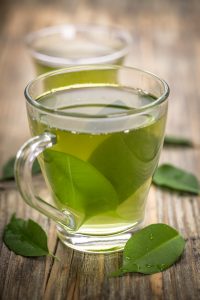
Green tea contains catechins, which are powerful antioxidants that may help protect the skin from sun damage.
In one study, participants were given either green tea or a control beverage. They measured skin photoprotection (protection against UV damage), structure, and function before and after the study. Following sun exposure, UV-induce damage was significantly reduced in the green tea group—up to 25% after 12 weeks of drinking the tea. They also saw that the green tea reduced roughness and scaling and improved elasticity, density, and moisture. The green tea also helped increase blood flow and oxygen to the skin. [18]
For maximum effect, avoid drinking tea around the same time as milk. This makes it harder for the catechins to do their job. [19]
Some dermatologists also recommending putting tea used bags beneath the eyes to reduce puffiness. [6]
Berries and Pomegranates
Berries contain polyphenols, which are plant-based compounds that act as antioxidants. They are also thought to reduce inflammation. [20] By consuming a wide range of berries, you can get a wide range of their antioxidants as well.
Berries are also a good source of vitamin C. Strawberries are especially high in vitamin C content—one cup provides 150% of the RDI. Most other berries contain 35% of the RDI for vitamin C. [7]
Pomegranates also contain polyphenols. These help regulate blood flow to the skin, delivering oxygen and nutrients and giving your skin a healthy glow. [6]
Remember to watch your sugar intake. Though natural sugar found in fruit is better than refined sugar, consuming too much sugar can counteract your efforts for better skin.
Greek Yogurt
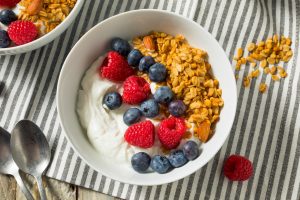
Greek yogurt has sometimes been called the “wrinkle fighter”. It is rich in B vitamins (B2 / riboflavin, B6 and B12) which work to detoxify your skin. Protein also gives your skin the extra strength and firmness it needs.
Fermented foods like yogurt are also full of probiotics (helpful bacteria) that will help your gut, and eventually your skin. This is because the probiotics help your colon eliminate waste, which means your skin doesn’t have to. [21]
Make sure this is Greek yogurt and that the sugar content is not too high. If dairy is not your friend, try other fermented foods such as sauerkraut or kimchi.
Coenzyme Q10 Foods
Coenzyme Q10 (or CoQ10) is a compound found in your cell membranes. Its is important for cell maintenance and energy. It is also an antioxidant that can help protect your cells against cancer. CoQ10 deficiency in the skin is thought to be linked with aging and wrinkles. [10]
One study published in the journal Biofactors shows that applying CoQ10 to the skin can help reduce wrinkles.[22] But CoQ10 can also be found in what you eat. CoQ10 foods include:
- Organ meets like kidney, heart, and liver
- Pork, beef, and chicken
- Fatty fish, including trout, herring, mackerel, and sardines
- Vegetables like spinach, broccoli, and cauliflower
- Fruits such as oranges and strawberries
- Legumes, including lentils, soybeans, and peanuts
- Nuts and seeds, like sesame seeds and pistachios
- Oils such as soybean and canola oil
- Can also be taken as a supplement
Some of those items probably look familiar. You can double up on benefits with super foods such as broccoli, fatty fish, spinach, nuts and seeds, and fruit.
Dark Chocolate

That’s right. Dark chocolate contains a type of polyphenols called flavenoids—antioxidants that help prevent oxidative stress, including in your skin. [7]
One study showed the effects of dark chocolate in women. After 12 weeks of consuming high-flavenol cocoa powder, women saw an increase in blood flow, skin density and skin hydration. The dark chocolate also decreased roughness and scaling. [23]
Scientists recommend that the chocolate be at least 70% cocoa and not high in sugar. Refined sugar can have a negative effect on your skin. [7] [6]
Foods to avoid:
Just like there are plenty of good foods for your skin, there are others that are not. Avoid or reduce these foods for glowing, healthy skin:
Refined sugar can damage collagen production and maintenance, so keep refined sugars as low as possible for thicker, healthier skin.
Alcohol is a natural diuretic, meaning that it dehydrates your body. This will lead to redness, breakouts, and dryness.
Junk foods are high in saturated fats, trans fats, salt, and processed ingredients. None of these are helpful for your skin and lead to other health problems such as obesity, diabetes, and heart problems.
Canned or packaged goods can contain chemicals like endocrine-disrupting chemicals (EDCs), which can cause hormonal imbalances. They could also have other trace chemicals and plastics. Try to buy/store foods in stainless steel, glass, or ceramic containers.
Bananas are high in sugar. While still better than refined sugar, try to eat bananas that are less ripe and eat them with protein (such as peanut butter).
Dairy products may not be so helpful for your skin. Milk contains hormones that can speed up signs of aging. Dairy products can also be an inflammatory. This one may vary from person to person; try going off dairy for three months to see if your skin is sensitive.
Corn is a grain with a high glycemic index, meaning that it has a lot of sugar. Though it is a tasty summer food, remember that it isn’t a vegetable and keep corn intake low. [24]
The Bottom Line
Healthy skin comes from within. There are a lot of foods that help your skin and others that do not. Look for foods with vitamin C, vitamin E, beta-carotene, protein, and omega-3s. These will help protect your skin from sun damage, prevent oxidative damage, and reduce wrinkles. They also boost collagen levels and promote better blood circulation to your skin. Prepare for your skin to glow as you eat these skin-healthy foods!
Check out similar articles: 19 Collagen Boosting Foods , Maximize Your Collagen Absorption
Resources
- https://www.ncbi.nlm.nih.gov/pubmed/25195602
- https://www.ncbi.nlm.nih.gov/pubmed/12480795
- https://www.ncbi.nlm.nih.gov/pmc/articles/PMC3257702/
- https://www.ncbi.nlm.nih.gov/pubmed/16029676
- https://www.ncbi.nlm.nih.gov/pubmed/23053552
- https://www.eatthis.com/foods-for-better-skin/
- https://www.healthline.com/nutrition/12-foods-for-healthy-skin
- https://www.ncbi.nlm.nih.gov/pubmed/20085665
- https://www.ncbi.nlm.nih.gov/pmc/articles/PMC4190204/
- https://www.webmd.com/beauty/features/beauty-skin-care-vitamins-antioxidants#1
- https://www.canyonranch.com/blog/beauty/the-skin-benefits-of-selenium/
- https://www.ncbi.nlm.nih.gov/pubmed/26970133
- https://www.ncbi.nlm.nih.gov/pubmed/26799467.
- https://www.ncbi.nlm.nih.gov/pubmed/26799467
- https://www.ncbi.nlm.nih.gov/pubmed/24121007
- https://onlinelibrary.wiley.com/doi/abs/10.1111/j.1365-2133.2008.08486.x
- https://academic.oup.com/ajcn/article/86/4/1225/4649573?maxtoshow=&HITS=10&hits=10&RESULTFORMAT=&fulltext=vitamin+C++wrinkles&searchid=1&FIRSTINDEX=0&sortspec=relevance&resourcetype=HWCIT
- https://www.ncbi.nlm.nih.gov/pubmed/21525260
- https://www.ncbi.nlm.nih.gov/pubmed/17213230
- https://www.ncbi.nlm.nih.gov/pmc/articles/PMC5055983/
- https://www.bustle.com/articles/13424-12-foods-to-eat-for-gorgeous-skin
- https://www.ncbi.nlm.nih.gov/pubmed/27548886
- https://www.ncbi.nlm.nih.gov/pubmed/16702322
- https://thespadr.com/best-foods-for-skin/

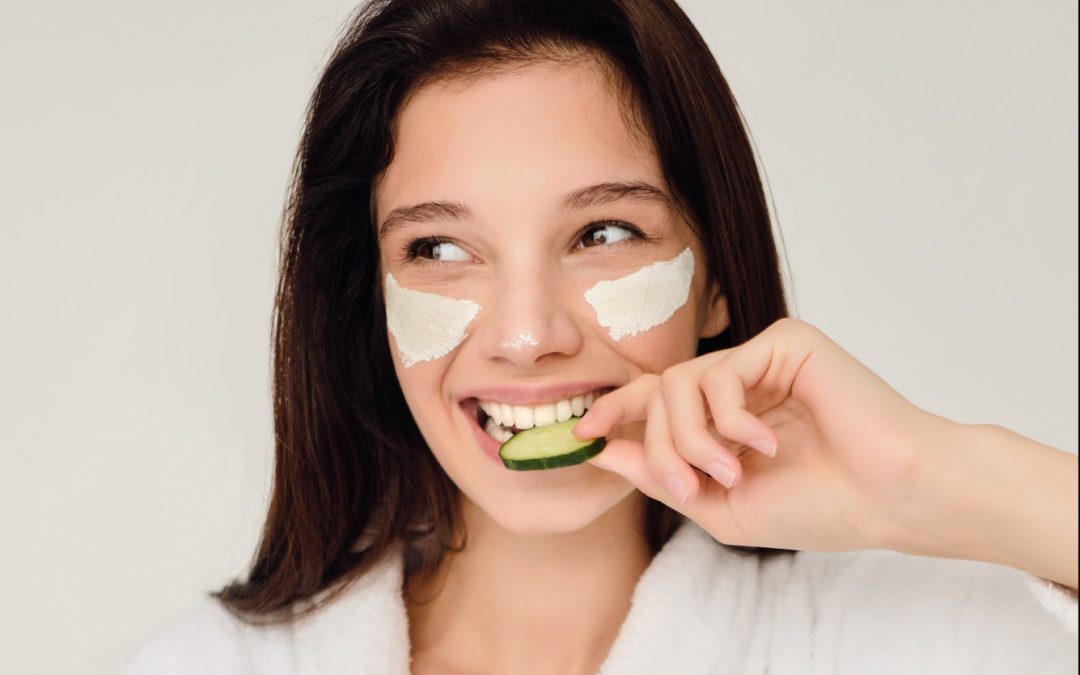
Recent Comments